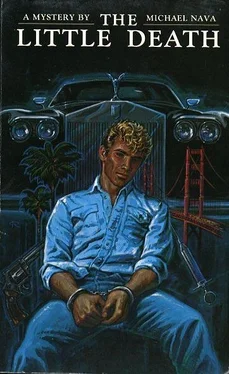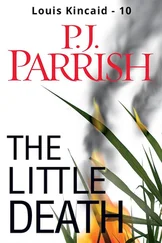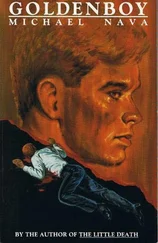Michael Nava - The Little Death
Здесь есть возможность читать онлайн «Michael Nava - The Little Death» весь текст электронной книги совершенно бесплатно (целиком полную версию без сокращений). В некоторых случаях можно слушать аудио, скачать через торрент в формате fb2 и присутствует краткое содержание. Жанр: Криминальный детектив, на английском языке. Описание произведения, (предисловие) а так же отзывы посетителей доступны на портале библиотеки ЛибКат.
- Название:The Little Death
- Автор:
- Жанр:
- Год:неизвестен
- ISBN:нет данных
- Рейтинг книги:5 / 5. Голосов: 1
-
Избранное:Добавить в избранное
- Отзывы:
-
Ваша оценка:
- 100
- 1
- 2
- 3
- 4
- 5
The Little Death: краткое содержание, описание и аннотация
Предлагаем к чтению аннотацию, описание, краткое содержание или предисловие (зависит от того, что написал сам автор книги «The Little Death»). Если вы не нашли необходимую информацию о книге — напишите в комментариях, мы постараемся отыскать её.
The Little Death — читать онлайн бесплатно полную книгу (весь текст) целиком
Ниже представлен текст книги, разбитый по страницам. Система сохранения места последней прочитанной страницы, позволяет с удобством читать онлайн бесплатно книгу «The Little Death», без необходимости каждый раз заново искать на чём Вы остановились. Поставьте закладку, и сможете в любой момент перейти на страницу, на которой закончили чтение.
Интервал:
Закладка:
I ordered a gin-and-tonic and took it to a table at the back of the room. Plants hung from the ceiling in big ceramic pots and the lighting was so dim that the atmosphere was nocturnal. Here and there in the darkness I saw a glint of polished brass or a mirror. Suspended from the center of the room was a large fan turning almost imperceptibly in the stale air. It was a place for boozy meditation — emotion recollected in alcohol, as someone once told me in another bar — and I was in a contemplative mood. For the first time in my adult life, I could not see any farther into the future than the door through which Hugh now entered.
I watched him step from the brightly-lit doorway into the dimness of the room, weaving slowly between tables as he approached me. He came up to the table, mumbled a greeting and sat down. He’d had some sun since I’d seen him last. His skin was now the color of dried roses, and his hair was a lighter blond than before but just as disheveled. I restrained an impulse to touch him. He leaned back into his chair, into the shadows. The bartender drifted over and stood in front of us a moment before taking Hugh’s order. Hugh looked up, ordered mineral water, and turned away, missing the bartender’s bright, yearning smile.
“I didn’t actually think you’d come,” he said in a low, slow voice.
“You could’ve called sooner. It’s been a couple of weeks.”
“Too risky,” he said, vaguely, as the bartender set a bottle of Perrier before him. “I have to limit my contacts with outside people.”
“Still in hiding?”
“You still don’t believe me?”
“I don’t think anyone’s trying to kill you. Something else has got you scared.”
“Junkies are fearless,” he replied. He reached out to pour from his bottle into his glass, but his hand shook so violently that he spilled the water on the table. He very slowly set the bottle down. Then, swiftly, everything fell into place for me.
I reached across the table and pulled him forward into the light. He did not resist. His skin was feverish to the touch. His pupils were tightly balled up and too bright. I laid his right arm on the table and spotted the mark almost immediately, a reddish pinprick directly above the vein a few inches above his wrist.
“When did you shoot up?”
“Not long ago,” he said, licking his lips.
“You told me you were clean.”
“I was. I ran into a friend.”
“When?”
“I don’t remember. Last week? After I saw you.”
“Why didn’t you call me?”
“I thought I could handle it. I can’t. I need help.” The princely face was covered with a film of sweat and its muscles sagged as though they were being pulled downward.
“I didn’t come here to babysit a hype,” I said, standing.
He reached out and grabbed my arm. He opened his mouth but nothing came out. I saw slow motion panic spread across his face. I stood above him for what seemed like a long time. Then, slowly, I eased back down into the chair beside him.
3
Outside it was dusk. I turned from the window back to the room, fumbling for a light switch. I pushed a button and three lights flickered on, unsteadily, from a brass fixture in the center of the room. Hugh was asleep in the bedroom at the end of the long, narrow entrance corridor. The toilet gurgled from the bathroom where I’d poured out his vomit and flushed it away.
From my law practice I knew that a heroin addict could stay clean long enough to clear his body of the addiction. If he began to use again it took him awhile to become re-addicted. Some addicts used casually — chipping, they called it — but sooner or later their habit caught up with them. Hugh was in the first stage of re-addiction. His body, recognizing the opiate for what it was — poison — struggled to reject it, making him sick. If he continued using, the sickness would stop and the body would make its lethal adjustments. That he was sick was encouraging because it meant there was still time to prevent his re-addiction.
Not that I knew how to prevent it. I poured myself a drink from the bottle of brandy I’d found in the kitchen. When a hype came to me, it wasn’t for medical advice or psychological counseling, but simply to stay out of jail. If I did that much for one of them, got him into a hospital or a drug program, then I considered myself successful. As to why someone became addicted or how he rid himself of the habit, those things remained mysteries to me. The only thing I was pretty sure about was that when dealing with an addict, the fact of addiction was more important than the drug. Thinking about Hugh I wished, for his sake, that I knew more.
I wandered aimlessly across the big, bare room. The house had the dank, decaying smell of so many Victorian houses, as if the walls were stuffed with wet newspaper. Hugh’s house, only a couple of blocks from Castro, was in a neighborhood undergoing renovation; many of the neighboring houses looked freshly painted or were in the process of reconstruction or were for sale. His house was untouched by this activity. Strips of paint peeled from the banister of the stairs leading up to the porch. Inside, the rooms were painted white, badly, in some spots barely covering the last application of gaudy wallpaper. The wooden floors were scarred and dirty. From the kitchen, the refrigerator shrieked and buzzed, then subsided to a low whine. It wasn’t the house of an heir.
Yet there were incongruous, aristocratic touches. There were dazzlingly white sheets on his bed and freshly laundered towels piled in the bathroom. The few pieces of furniture scattered around the house were of obvious quality. The brandy I was drinking was Courvoisier VSOP, and the glass from which I drank it appeared to be crystal.
I found myself at the bookshelves which held a couple of dozen books. Many of them were worn-out paperbacks, Tolkien, Herman Hesse, a volume of Ginsberg — the library of a college sophomore of the sixties. I opened the Ginsberg. Written on the flyleaf were Hugh’s name, the year 1971, and the words New Haven. Inspecting the second shelf, I saw the books were poetry, mostly, and by people I’d never heard of. The spine of one volume was cracked and when I opened it a sheaf of pages fell out, fluttering to the floor. I knelt down to pick them up and saw, on the bottom shelf, a framed photograph laid face down. I picked it up with the pages, put the book back together and turned the picture over.
It was the portrait of a woman, a lady, I thought. She may have been as young as fifty. It was hard to tell from the black and white photo whether her hair was white or an ashy shade of blond. Light and darkness had been tactfully deployed on the plain background behind her. The obvious effect was timelessness and the apparent reason was the woman’s age. Still, there was an elegance in her angular, handsome face quite apart from the photographer’s craft, and a kind of luster in the brightness of her hair and eyes. I thought she must have once been beautiful.
“My mother,” a voice commented behind me. I nearly dropped the picture in surprise and turned to find Hugh standing at the edge of the room, just outside the light. He stepped forward, white-faced, his eyes exhausted. “Sorry. I didn’t mean to come up on you like that.” He held out his hand for the photo and I gave it to him. He studied it a moment then returned it. I laid it back on the bookshelf.
“Nice picture,” I said. “Looks professional.”
“The official portrait,” he said, with a trace of contempt in his voice. “It appears on all the dust jackets.”
“She writes?”
He nodded, seating himself on a corner of the couch, drawing a thick sweater across his bare chest. I noticed for the first time, watching him, that the room was cold. “What has she written?”
Читать дальшеИнтервал:
Закладка:
Похожие книги на «The Little Death»
Представляем Вашему вниманию похожие книги на «The Little Death» списком для выбора. Мы отобрали схожую по названию и смыслу литературу в надежде предоставить читателям больше вариантов отыскать новые, интересные, ещё непрочитанные произведения.
Обсуждение, отзывы о книге «The Little Death» и просто собственные мнения читателей. Оставьте ваши комментарии, напишите, что Вы думаете о произведении, его смысле или главных героях. Укажите что конкретно понравилось, а что нет, и почему Вы так считаете.












